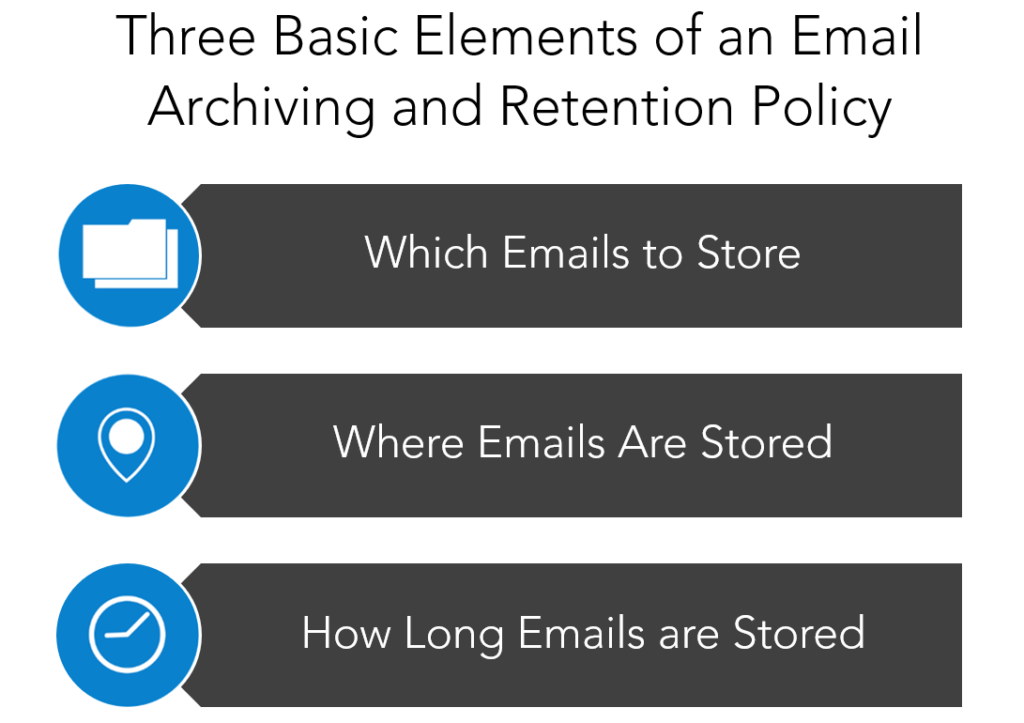Why an Email Archiving and Retention Policy Reduces Your Company’s Risk [Plus Tips for Designing One]

Most companies (regardless of size) don’t have an email archiving and retention policy in place. Actually, most haven’t even considered it.
Most organizations don’t think about an email archiving and retention policy until they need to free up electronic storage space, and then the most common solution is to delete or archive any email prior to a certain date.
But a true email archiving and retention policy isn’t just about freeing up space; it’s about reducing a company’s overall risk.
Companies that have longer email retention policies in place (or no email archive and retention policy at all) could potentially be taking on unnecessary risk.
Here, we’ve outlined what an email archiving and retention policy is, how it can reduce a company’s overall risk and how you can implement one for your organization.
What is an Email Archiving and Retention Policy?
An email archiving and retention policy is your company’s documented standards for saving email communications. A comprehensive policy should include guidelines for which emails to store, where those emails should be saved and for how long.
While each company’s needs are unique, a general guideline for email archiving best practices includes saving emails pertaining to company policy changes, decisions made by company leadership, administrative and human resource correspondence, invoices and receipts.

How does an email archiving and retention policy reduce my company’s risk?
There are several ways that an email archiving and retention policy reduce risk, but here are four of the most impactful benefits:
1. Compliance
Depending on your organization’s industry and function, the regulatory statutes about how you manage data will vary, but, in general, all emails that contain employee and client records, contract negotiations, company policy changes and employee reviews and reprimands should be stored and archived for easy retrieval.
By forming an email archiving and retention policy that considers all regulations and requirements that your company is subject to by law, you can create a solution that helps you to stay in compliance and reduce your company’s regulatory risk.
2. Litigation Support
If you are ever sued, you may be ordered by the court to produce documentation (like emails) to support your case.
Pulling emails off of a backup can be a massive undertaking, and, on the other hand, having years of email history can also play against you in court by increasing your company’s exposure to legal examination.
To balance this, companies should have an email archiving and retention policy that meets their needs and addresses the types of email communications that should be saved and the length of time they should be archived.
3. Free Up Storage Space
Running out of space in your email isn’t just frustrating; it kills productivity on your team. Email archiving and retention policies can help you to free up space on your email servers.
Setting an inbox retention time as part of your arching and retention policy can automatically help with email storage.
4. Improve Workflow Systems and Procedures
Another benefit to email archiving is your ability to search, document and organize information pertaining to servicing customers, delivering a product, sending out a proposal and selecting vendors.
Establishing protocols for email archiving can help you recall important conversations for past projects should you need to look back to see why a decision was made.
An email archiving and retention policy/system would allow you to perform searches of both keywords and attachments to find emails in minutes—even seconds—rather than hours or days. This can be a huge help and time saver if you need to quickly access a critical email.

So how do you design an email retention policy that works for your company?
Because an email retention policy has so many different facets, impacts different areas and varies by organization and industry, it’s best to design your policy with collaboration from a few different parties.
In particular, it’s important to consult your IT provider, your legal advisor and your company leadership so that you can make sure that all requirements are being met and that you’re implementing a solution that works best for your company’s unique needs.
By pairing these three perspectives, companies can best stay on track, understand the impacts a policy will have on different areas of your company, and navigate the legal requirements and technology options.
It’s likely that each department within your company will advocate for certain retention periods or prefer one solution over another, but having a team of trusted advisors can help you make the decisions about what’s best for your organization as a whole.
Get help with designing and implementing an email archiving and retention policy
If you’re ready to design an email retention policy that works for your company, contact your Warren Averett Technology Group consultant today or ask a member of our team reach out to you

